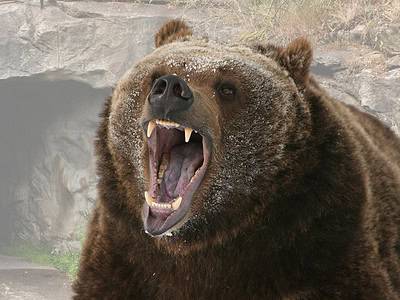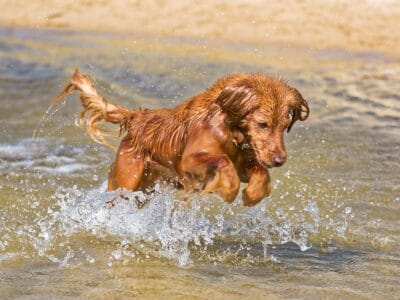Huntaway
Canis lupus
Huntaways have a strong instinct for herding.
Advertisement
Huntaway Scientific Classification
- Kingdom
- Animalia
- Phylum
- Chordata
- Class
- Mammalia
- Order
- Carnivora
- Family
- Canidae
- Genus
- Canis
- Scientific Name
- Canis lupus
Read our Complete Guide to Classification of Animals.
Huntaway Conservation Status
Huntaway Facts
Huntaway as a Pet:
- General Health
- Energy Level
- Shedability
- Trainability
- Intelligence
- Tendency to Chew
- Size
- Family and kid friendliness
- Yappiness / Barking
- High
- Separation Anxiety
- High
- Preferred Temperature
- Average climate
- Exercise Needs
- High
- Friendly With Other Dogs
- Moderate
- Pure bred cost to own
- $400
- Dog group
- Herding
- Male weight
- - lbs
- Female weight
- - lbs
This post may contain affiliate links to our partners like Chewy, Amazon, and others. Purchasing through these helps us further the A-Z Animals mission to educate about the world's species.
View all of the Huntaway images!
Huntaways are known for their loud, deep, and sustained barking when they herd sheep.
The Huntaway dog was first bred in New Zealand in the early 1900s. Farmers needed a sturdy, fast dog with a talent for keeping track of their herds of sheep. The combination of speed, agility, and stamina possessed by this canine has earned it the nickname, New Zealand’s sheepdog. They are categorized in the herding group.
See all of our expert product reviews.
This dog’s temperament is affectionate and protective. They are fond of children especially when running around, jumping, and playing games. A family searching for a smart, energy-filled dog with a loyal nature should give this breed a closer look.
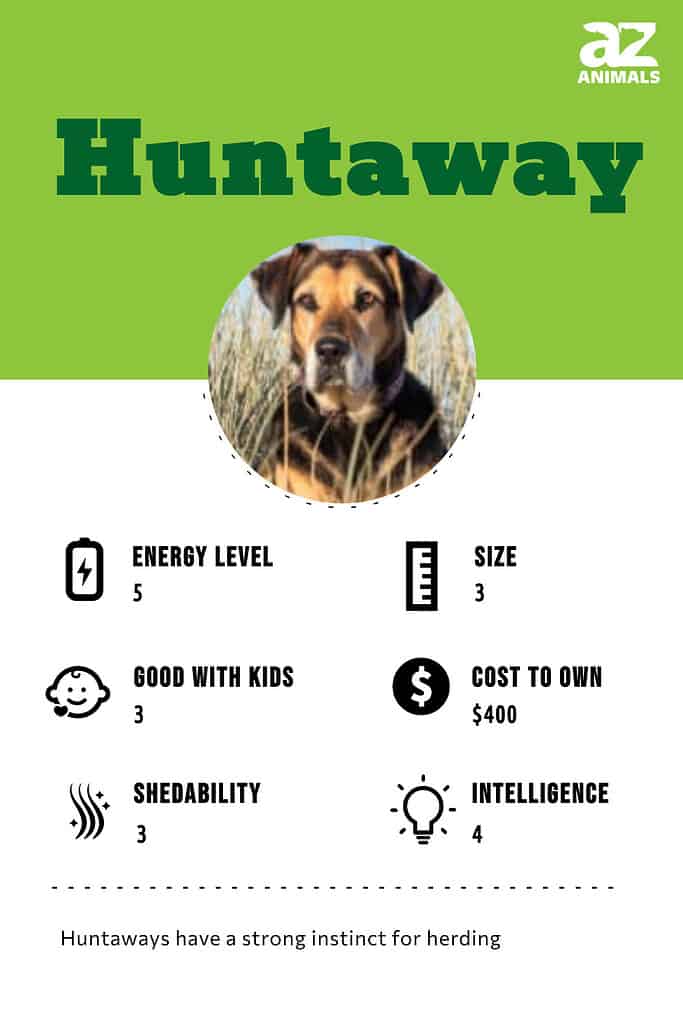
3 Pros and Cons of Owning a Huntaway
| Pros! | Cons! |
|---|---|
| Enjoys time with kids: This dog’s lively personality and adaptable temperament make it friendly towards kids. | A big barker: This herding dog has a loud, barking voice. But proper socialization can help it to learn when to use its bark. |
| A dutiful watchdog: The loud, deep bark of this canine helps let its family know if someone is at the door or near the house. | A wanderer: These dogs were bred to cover a lot of ground to watch over their sheep. So, this pet may be tempted to wander outside a family’s property line. |
| A quick learner: The intelligence of this herding breed gives owners an advantage when going through obedience training. | Seasonal shedding: This breed is known to shed more hair in the summer season. |
Origins
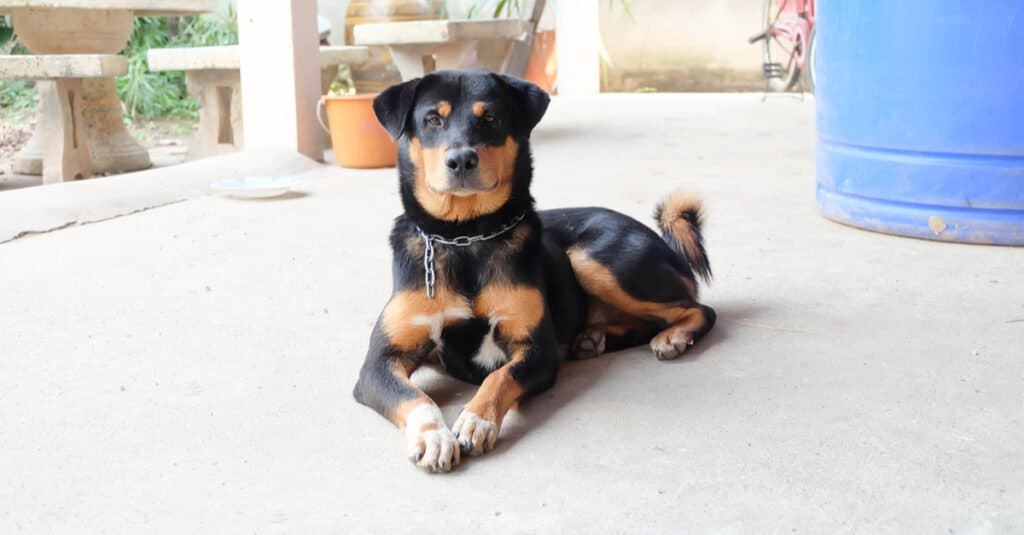
©pinrat/Shutterstock.com
Sheep farmers in New Zealand soon found that a new herding companion was required to enable them to keep abreast of their flocks at all times.
They were going to need an intelligent, energetic canine, with a loud bark, and the ability to work alone or as part of a team. It took combining several breeds: collies, English hounds, labradors, and Old English sheepdogs, and the rest as they say is history.
By the 1900s, the huntaway came into being. A large, hardy canine, it came with a deep, bark which could carry for miles. It was also sufficiently robust to cover large distances and handle inclement weather, making it the perfect herding assistant for sheep farmers in a different new climate.
Health and Entertainment for your Huntaway
See all of our expert product reviews.
Size and Weight
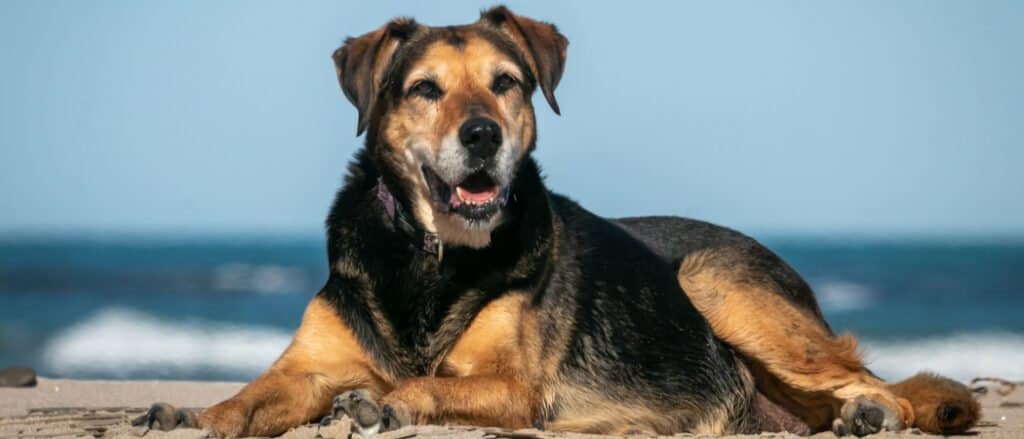
Huntaways are large, sturdy, and energetic
©S Curtis/Shutterstock.com
This breed is a sturdy, compact dog. A male can grow to a height of 26 inches and a female can be 24 inches tall at the shoulder. A male can be as heavy as 88 pounds while a female can weigh 77 pounds. Seven-week-old puppies weigh an average of five to six pounds. They are full-grown by the age of 18 months.
| Height (Male): | 26 inches tall |
| Height (Female): | 24 inches tall |
| Weight (Male): | 88 pounds |
| Weight (Female): | 77 pounds |
Common Health Issues
This breed has a certain amount of health issues for potential owners to consider. Hip dysplasia is a health issue of this lively dog. This is when the hip joint has not formed correctly. A limping or hopping dog may be experiencing this condition. Unfortunately, bone cancer is another health issue faced by this breed. A visible lump, lameness, or pain are all potential signs of bone cancer in this dog. The treatment depends on the severity and specific type of bone cancer involved.
Ear infections are also common in dogs with long ears and this breed is no exception. Mud or dusty debris can accumulate in this dog’s ears, leading to bacteria growth and infection. Regular cleaning is a good tactic to prevent infection. But, if this dog gets an ear issue, these infections can be treated by a vet.
The most common health issues are:
- Hip dysplasia
- Bone cancer
- Ear infection
Temperament and Behavior
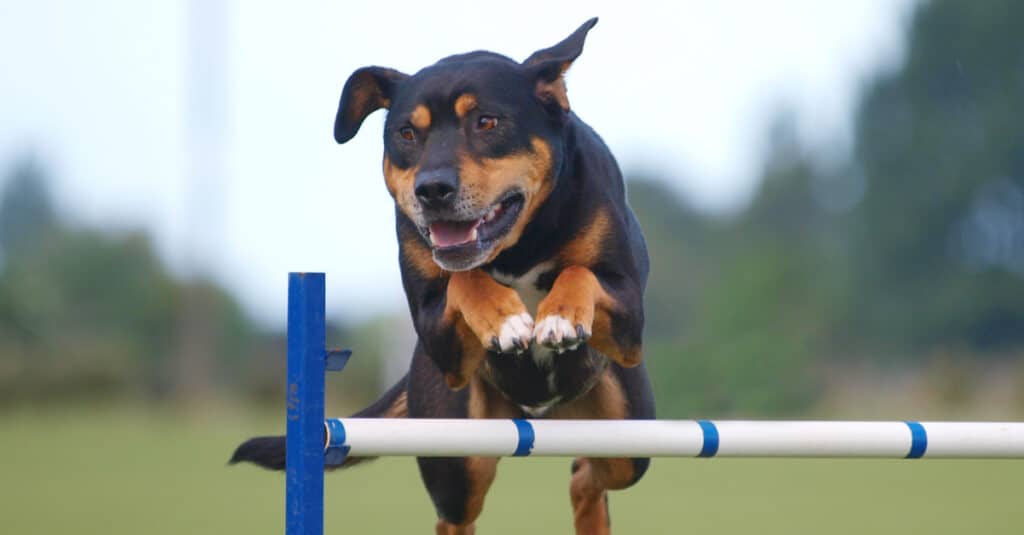
Huntaways are renowned for their alertness and agility
©Margo Harrison/Shutterstock.com
This dog is always alert to its surroundings. Alertness and agility are two of the most important traits in a dog bred to take charge of a large flock of sheep. Even if it’s not herding sheep, this dog notices the activities going on all around it. So, if a family member picks up a ball or a frisbee for a game, this canine will take note!
Though they were bred for the hard work of herding sheep on a ranch or farm, these dogs are known for their affectionate behavior. They love to be praised and patted. This is a great quality for a family dog. Unlike a basset hound or a bulldog, a Huntaway has a lively personality. This dog would fit well into a family that likes to be traveling around and having fun!
How to Take Care of a Huntaway
Caring for a Huntaway puppy or older dog is easier if you know more about the breed’s specific needs. Giving this pet the proper diet, exercise, healthcare, and grooming attention can help it to live a long and happy life in your family.
The Best Dog Food for Huntaways
The right diet gives your Huntaway the energy it needs to get through its active day. Huntaway puppies require a different diet than full-grown dogs.
Huntaway puppy food: These puppies need DHA in their diet to support the healthy development of their eyesight and brain. Protein aids the development of muscles and bones. Paying special attention to healthy bone development is important in a breed vulnerable to bone cancer. Carbohydrates give these puppies the energy to support their running, jumping, and exploring activities. It’s best to serve these puppies four small meals each day to keep their energy up throughout their waking hours.
Huntaway adult dog food: Protein in an adult dog’s diet contributes to the strong muscles and cartilage of this very active pooch. Calcium is an ingredient that adds even more strength to this dog’s bones. Maintaining the bone health of this dog may head off hip dysplasia. Fat in its diet gives it stamina and energy for the long periods of running characteristic of this dog. Vitamin A maintains this dog’s healthy eyesight. Adult dogs should be fed twice per day, once in the morning and once in the early evening so the food can be digested before sleep time.
The A-Z Animals choice best dog food for Huntaways is Victor Purpose – Performance Dry Dog Food.
Meet a combination of glucosamine and chondroitin sulfate that helps keep Huntaways’ joints mobile and pain-free, all in a formula specifically for active dogs. Its protein content is 26%, 81% of which derives from real, quality meat. There’s even supplemental vitamins, minerals, and other nutrients for complete immune system support.
Here’s where to get Victor Purpose Performance Dog Food on Chewy and Amazon.
- 81% meat protein with premium-quality beef, chicken and pork meals
- Ideal for sporting pups and those with high physical demands
- Contains glucosamine and chondroitin for long-term joint health
- Fortified with vitamins, minerals, essential fatty acids, protein and amino acids
- Promotes digestion and immune health
Maintenance and Grooming
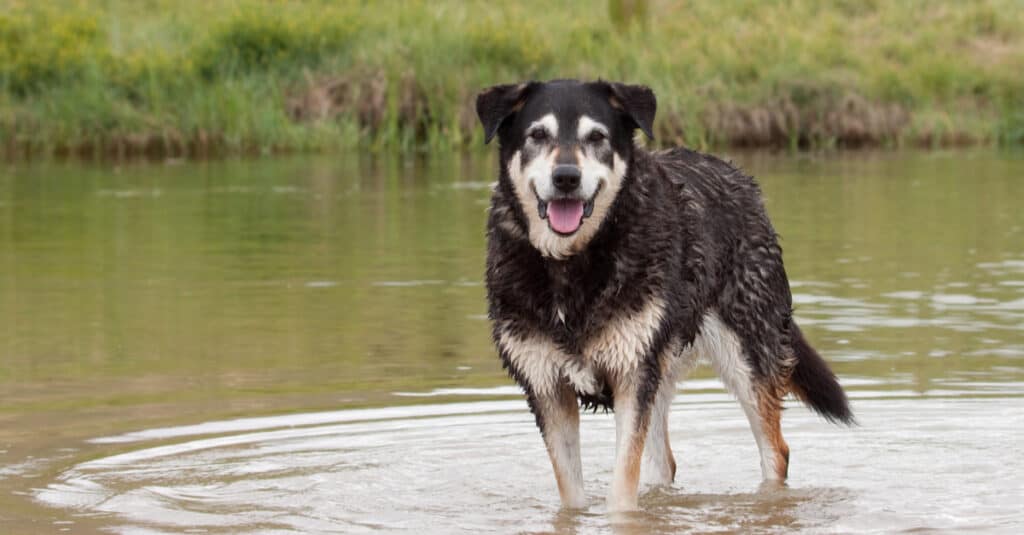
Huntaways shed heavily at the beginning of summer and are prone to ear infections
©S Curtis/Shutterstock.com
How much does a Huntaway shed? These dogs are average shedders. Keep in mind they do increase shedding activity at the start of the summer season. A good grooming routine for this dog involves brushing its short, wavy coat once per week. At the beginning of the summer season when this dog sheds more than normal, a slicker brush can remove dead hair from its coat.
They are prone to getting infections in their ears. This is common for many dogs that have long, furry ears. So, when grooming, take a moist, soft cloth and wipe the underside of each ear to remove excess wax and dirt. Ask a vet if there is a mild cleaning solution that would be appropriate to use on the dog’s ears. Cleaning a Huntaway’s ears gives you a chance to spot any potential infection right away so you can get treatment for it if necessary.
Training
Like most herding dogs, Huntaways are intelligent with alert senses. Consequently, the obedience training process is relatively simple with this breed.
Exercise
Daily exercise is at the top of the list of requirements for this dog. They are strong dogs with stamina so taking this pet to a nearby field or woods is a great way to just let it run off some energy! It’s a smart idea to make sure your Huntaway is fully trained before letting it off the leash to run in any environment.
Come up with games that give this dog a task to complete. Like playing a game of tug-of-war with a rope bone or asking the dog to find a toy you’ve hidden somewhere in the yard. Think about it. These dogs were bred for the task of herding sheep. So, they are most happy when they have a goal to work for.
Is this dog appropriate for life in an apartment? No, it needs more space than an apartment can provide A farm or a home with a large fenced-in back or front yard are the best types of homes for this pooch with the sweet personality.
Puppies
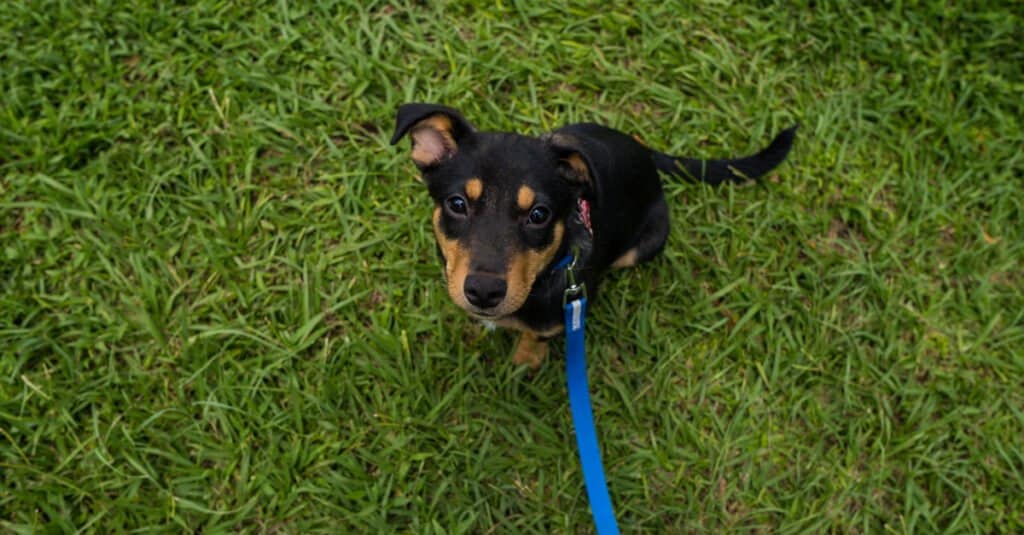
©Wirestock Creators/Shutterstock.com
Socialization is important for any dog breed but is especially critical for this one. Why? Because a Huntaway puppy that’s not properly socialized is likely to grow into an adult dog that tries to herd children, adults, and pets in a home. Keep in mind they are only doing what they were bred to do. But careful socialization from the time it is a puppy can show this breed when herding behavior is appropriate.
Huntaways and Children
Even a socialized Huntaway can revert to its natural herding instincts. So, it’s best to keep an eye on the meetings between a child and the family’s Huntaway until it’s clear the dog understands what is expected of it.
Dogs Similar to Huntaways
Border Collies, Australian Cattle dogs, and Belgian Sheepdogs are all similar breeds to the Huntaway.
- Border Collie-These are quick-minded dogs with a friendly temperament like the Huntaway breed and have the same lifespan. But the Huntaway is bigger in size including both height and weight.
- Australian Cattle Dog-Both are herding dogs and share an affectionate temperament. Plus, they have a similar lifespan. As for size, the Huntaway breed is heavier and taller.
- Belgian Sheepdog-This dog is intelligent with a serious-minded temperament when it comes to herding sheep. But, unlike the Huntaway, the Belgian Sheepdog’s coat can be silver and black, white and black, gray, and black, fawn and black as well as other color combinations. Alternatively, a Huntaway’s coat is black, brown, or pied.
Popular Names for Huntaways
Popular names for this breed:
- Rocky
- Dynamo
- Ranger
- Bree
- Marika
- Fern
- Gypsy
- Echo
- Lady
Huntaway FAQs (Frequently Asked Questions)
How much does it cost to own a Huntaway?
Breeders charge an average of $400 for these puppies. There are Huntaway rescue organizations as well that make these dogs available for welcoming homes. These rescue groups have minimal adoption fees. A rescue organization talks with potential owners to make sure this breed is a good fit for their household.
An owner should have a food budget of between $40 and $50 per month to feed this playful canine.
Is the Huntaway good with kids?
Yes. When this dog is socialized, it’s affectionate and loving with kids.
How long does a Huntaway live?
It has a long lifespan of 12 to 15 years.
What breeds make a Huntaway?
The Huntaway came about by breeding Border Collies with British sheepdogs and Rottweilers. Breeders wanted to find an agile sheepdog with a loud bark that would easily direct the herd. Mission accomplished!
How big is a Huntaway dog?
Males can grow to 26 inches at the shoulder and weigh as much as 88 pounds. Females have a height of up to 24 inches and weigh up to 77 pounds.
Do Huntaways make good pets?
Yes, as long as a family understands the needs of this breed. They are known for their agility and high-energy. Daily exercise is essential to help this dog thrive physically. It’s an active canine that needs mental stimulation in the form of games, toys and plenty of interaction with its family and other dogs.
Thank you for reading! Have some feedback for us? Contact the AZ Animals editorial team.
Sources
- Animal Care Tips / Accessed September 27, 2021
- caninecancerawareness.com / Accessed September 27, 2021
- Hill's / Accessed September 27, 2021
- American Kennel Club / Accessed September 27, 2021
- The History Junkie / Accessed September 27, 2021
- PetMD / Accessed September 27, 2021












